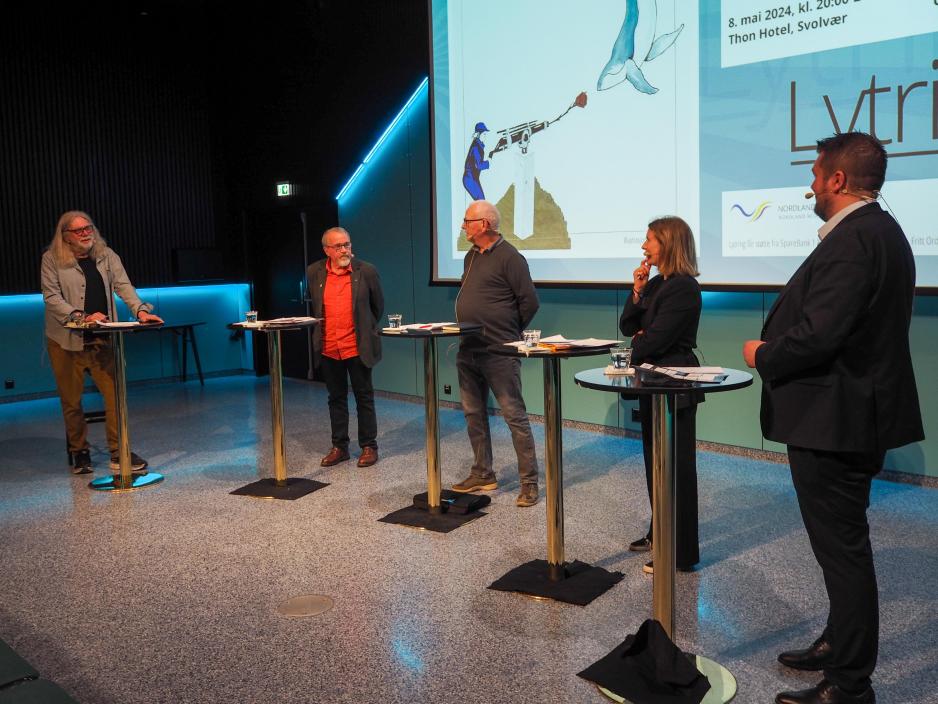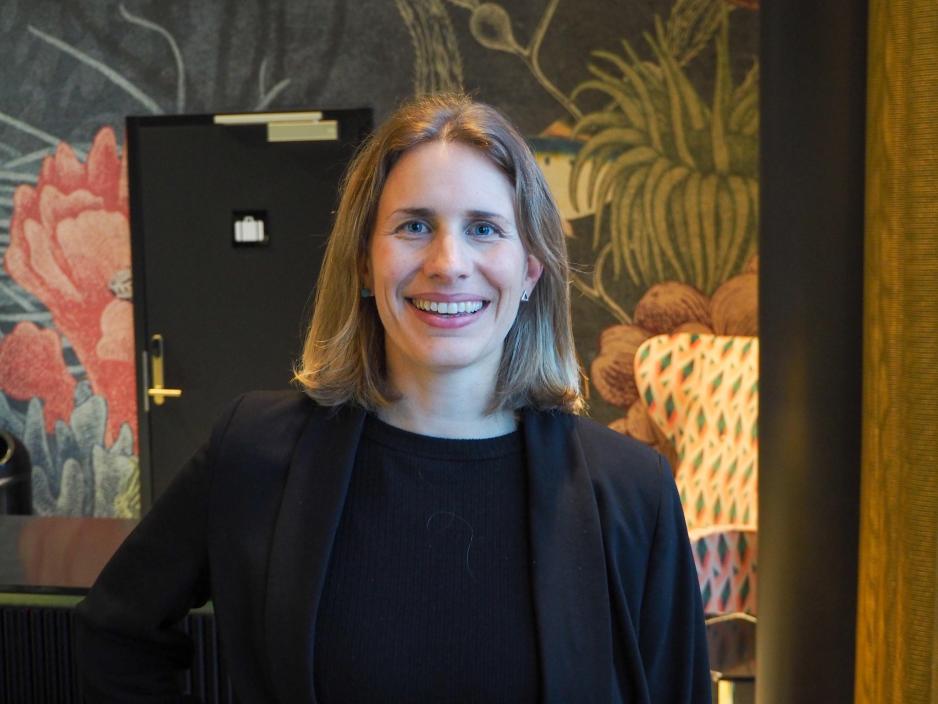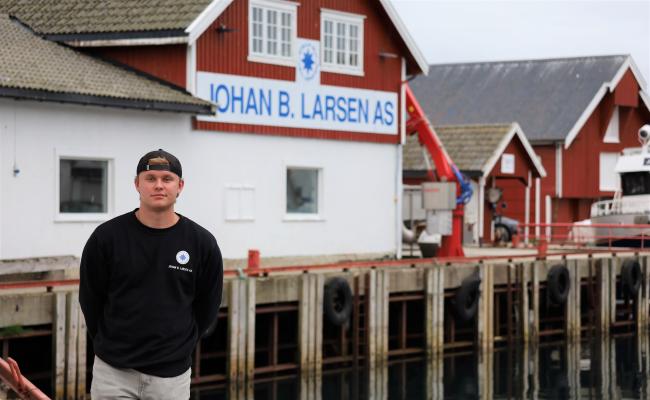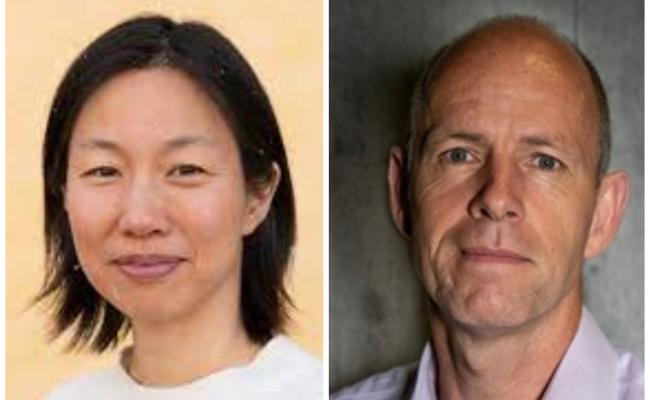Lytring: Whaling Debate Highlights Need for Industry Supervision

Lytring debate in Svolvær titled 'Is whaling dead?'. From the left: Editor of High North News and debate leader Arne O. Holm, Tore Haug from the Norwegian Institute of Marine Research, Truls Soløy from Norges Småkvalfangerlag, Unn Haukenes Holgersen from the Nordland Research Institute, and Vidar Thom Benjaminsen, Mayor of Vågan municipality. (Photo: Birgitte Martinussen)
Svolvær (High North News): Whaling has long been a disputed topic, with whalers on one side and animal rights activists on the other. During a debate in Northern Norway, both sides agreed that the whaling industry must be regulated and controlled to benefit both the animals and the industry.
Today, Norway, Iceland, Japan, the USA, Russia, and Denmark (Greenland) are the only countries that still engage in whaling. Only the first three do commercial whaling, while indigenous peoples hunt bowhead whales, gray whales, minke whales, and fin whales in the latter three.
Whaling has created a rift between politicians, animal and environmental activists, and whalers for a long time. The arguments against whaling include animal welfare, the economy, and a sustainable marine ecosystem, while the other side argues for the conservation of coastal culture and industries, as well as focus on sustainable and local food.
The minke whale is the only whale allowed to hunt in Norway. In the past few years, the base quota has been for 917 whales, but participation has been low, and the number of animals caught has been well below the set quota.
In 2023, the quota was for 1000 whales, and just half, 507 animals, were caught. Only nine boats participated in last year's whaling.
Norwegian whale is only exported to Japan, which buys a little over a third of the Norwegian catch. The rest of the international market is closed.
The minke whale
- A baleen whale in the fin whale family
- Can be found all over the world
- The basis of Norwegian small whale hunting, which began in the 1920s
- Can become between eight or nine meters long and up to nine tonnes in the North Atlantic
- Can likely become over 40 years old
- The Norwegian population of about 150,000 has been stable for the last 2-3 decades
On May 8th, the Lytring debate series, led by HNN's Editor Arne O. Holm, addressed the topic' Is whaling dead? '. The debate took place in Svolvær, Northern Norway.
The panel included Vidar Thom Benjaminsen (Conservatives), Mayor of Vågan municipality, Unn Haukenes Holgersen, Researcher at the Nordland Research Institute, Truls Soløy, leader of Norges småkvalfangerlag [the Norwegian small whale hunter's organization, ed. note], and Tore Haug, Researcher from the Norwegian Institute of Marine Research.
Norwegians do not eat whale meat
Whaler and leader of Norges småkvalfangerlag Truls Soløy said during the debate that there is no market for whale meat in Norway today and that the market limits how much of the quota the whalers can actually catch.
Since whale meat can only be exported to Japan, Norwegian whalers call for better marketing of whales within the country's borders, specifically with the help of the Norwegian Seafood Council.
"Norwegian have stopped eating whale meat, so it is the Norwegian market that has failed," says the whaler and continues:
"We want marketing in Norway within the channels the Norwegian Seafood Council has at their disposal, which is godfisk.no and Fiskesprell."
However, the whalers did not get approval for the marketing of whale meat through the Norwegian Seafood Council when the proposal was processed in parliament last year.
Former Minister of Fisheries Bjørnar Skjæran then stated: "If the Seafood Council uses resources to market whale meat, that could have negative consequences for the export of seafood."
Balance in the ecosystems
Another central argument for whaling is that it is essential for regulating the stocks in the sea.
In a press release regarding the whaling quota from February this year, the then Minister of Fisheries, Cecilie Myrseth (Labor), stated that "Norwegian whaling contributes to balance in the marine ecosystems."
During the debate, Researcher Tore Haug from the Norwegian Institute for Marine Research said that Norway does not hunt whales to spare capelin and herring but because they are good food.
"We do not catch whales to regulate the population. We catch whales for the same reason we catch cod or herring – because it provides us with good food from the sea. However, it is sensible to take from all levels of the food chain."
Call for more knowledge
Unn Haukenes Holgersen, Researcher at the Nordland Research Institute, calls for a broader knowledge base regarding whaling.
She believes there is a lack of knowledge in several areas and that parts of the research on which the authorities base their claims are beginning to be outdated.
"It looks like we lack knowledge on several planes regarding animal welfare, basic knowledge about the minke whale and its role in the ecosystem, and the health effects of whale meat," says the researcher in an interview with High North News.
"The studies that cover the animal welfare aspects are mainly older studies which focus on the moment of killing. There is a call to obtain more information about animal welfare throughout the entire hunting process today. That applies to the whole operation, before, during, and after killing with autopsies."
"When we base ourselves on older studies, it is fair to ask whether the animal welfare conditions have changed during the hunting process and which practical animal welfare measure could be implemented to better it."
The researcher thinks it is important to remember that Norway opposes an international ban on commercial whaling and that, therefore, it is extra important that the arguments to continue are well-documented.
"It is important to specify that we are opposing an international ban and recommendations. Therefore, the authorities should be able to point to a solid and updated knowledge base in their statements," says the researcher.
"Personally, I miss a comprehensive knowledge base that is not only based on population estimates and the moment of killing, but a review of the various elements in a holistic way and how sustainable whaling is. On what premises do we base sustainability, and what value does the minke whale have beyond the dinner plate? Which is more important?"
Norwegian whaling
- Modern whaling was made possible by steam-operated boats and the invention of the explosive harpoon at the end of the 1800s.
- In 1904, the whale was protected following demands from fishers who believed that the major reduction in the whale stock was hurting the fisheries.
- The industrial moved mainly to Antarctica and the Antarctic Ocean.
- In the 1930s, the industry was hit by the global economic crisis, and the Norwegian whaling fleet lay dormant.
- During this period, international regulatory agreements came into being, and later, requirements for licenses and maximum catches per boat, among other things.
- The International Whaling Commission (IWC) adopted a moratorium on commercial whaling in 1986. Norway introduced a temporary halt in minke whale hunting in 1987 to carry out a population estimate.
- Norwegian whaling resumed in 1993 following the population estimate and the introduction of regulations and calculation models for sustainable hunting, but participation in the hunt has been low since.
To the benefit of both sides
During the debate in Svolvær, it was clear that the industry's lack of supervision poses a problem for both sides.
There are no requirements for inspectors, observers, or supervision during the whaling process. Last year, the requirement for a voyage data recorder was also removed.
After a question from the audience about whether the lack of inspection and control could entail a loss of legitimacy and become a reputation problem for whaling, Truls Soløy replied that the topic has been discussed within the industry and that they welcome inspectors back on the boats.
The mayor of Vågan municipality, Vidar Thom Benjaminsen, adds that a proper control system increases trust in the industry and that the industry itself can stand firm.
Researcher Unn Haukenes Holgersen says that better industry control could contribute to an updated knowledge base on whaling at all stages.




